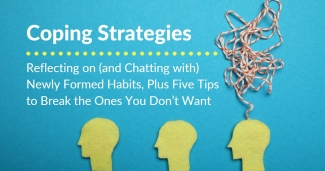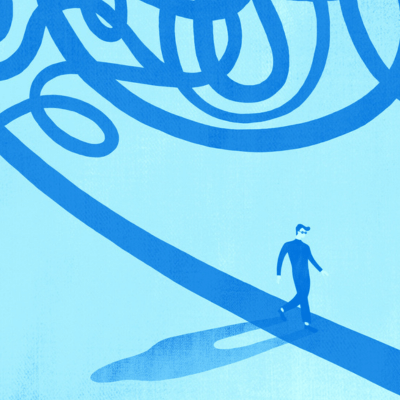Coping Strategies: Reflecting on (and Chatting with) Newly Formed Habits, Plus Five Tips to Break the Ones You Don’t Want
[Editor’s Note: Every month, MCN’s Director of Witness to Witness, Kaethe Weingarten, PhD, shares stories, resources, and helpful tips to support health care workers during these ongoing unprecedented times. Dr. Weingarten also offers a twice-monthly newsletter, filled with resources, recent articles, and her news and views. Sign up for the newsletter on the Witness to Witness webpage.]
I’m 75 years old and I cannot remember a period of time as packed with big changes out in the world I live in as those of the past seven years. The gut-wrenching, nerve-wracking, upsetting, infuriating, depressing news has led to my developing a new set of coping strategies – and I believe that many others have, too.
For example, prior to the 2016 election, I rarely watched television and didn’t know much about any of the popular shows. Now I can discuss episodes of all available seasons of The Great British Baking Show, comment on my favorite bakers, and even recall the most beautiful showstoppers and the hardest technical challenges! And that is not the only show I can cite chapter and verse on. In the last few years, I began to use TV to decompress. In the past, I might have read a book to unwind. Now, it’s unlikely I can focus sufficiently at 8 PM for reading to soften my edges and prepare me for bed.
Most people I know in recent years have formed a habit they didn’t have before. In a hilarious article in McSweeney’s, Emily Delaney gives voice to her afternoon nap in a piece titled, “I’m a short afternoon walk and you’re putting way too much pressure on me.” Her walk’s voice says what many of these new habits might:
Now, I’m both your leisure activity and your only form of exercise. I’m the last thing tethering you to reality, yet your only way of escaping it. I’m the singular effort you make to maintain your sanity and your sole means of experiencing joy, hope, and happiness. It feels as if I’m your lover, friend, and therapist all wrapped into one, and, frankly, it’s making me uncomfortable.
I use an afternoon nap to escape not just the problems at hand but the headache I can feel coming on as I slog through them or bat at them. My afternoon nap might complain to me the way Delaney’s walk does. My nap might say:
Do you really think that falling asleep is going to erase your worries and ease your heart, mind, and soul? Don’t you recall that when you wake up from me, in that first fully conscious moment, you are worse off than when you lay down? Don’t you think it might be better to forge ahead and take care of some of what you are trying to push aside, and spend the time solving not avoiding problems?
How should I respond to my afternoon nap? Tell the nap that the hour of relief is worth the pain of the return to reality? Ask if the nap hears the same answer from most others who employ a nap in that manner?
I asked a few friends whether they had noticed any new habits creeping into their daily routine in the last few years. I got an earful. One friend talked about snacking, but didn’t want to hear what snacking said. Instead, my friend said it might be better to hear from the thirty pounds that were new additions to her sturdy body. This is what my friend reported that those pounds had to say:
I’m delighted to have met your acquaintance and I really do hope you will let me become a permanent resident. You are so good about meeting my preferences! I’m happy to sit most days on a comfortable chair or couch and know that every hour or so, some delicious morsel will course through my cells. Yum! I think we have the beginnings of a lasting friendship.
Another friend told me my question had struck her just as she had returned from her doctor who had given her a two-week order to refrain from using her thumb to text. She told me she hadn’t really thought she might have to let texting know the bad news, but now that I had framed my comment to her the way I had – asking if she had noticed a new steady relationship forming over the last seven years -- she realized she was going to have to inform texting that this wasn’t a permanent break-up but a short interlude, a vacation, from each other.
It is also true that some people reported habits that help them cope, but not ones they intend to limit or get rid of. One friend mused that while her interactions with her dog may be helpful to her -- and she is in the habit of interacting with her, loving her, throughout the day --she certainly is not about to change that behavior! On the contrary, she notes that like nap or afternoon walk, dog doesn't reply to her questions or frustrations. Just a turn of her head or a low growl lets her know dog is listening, which is all she needs.
Many people have developed habits they would not have developed under less stressful circumstances. Whether politics, COVID, or something else, there has been much to handle on a daily basis. We are all witnesses to other people’s tragedies through many more channels of information than ever before. We may also do work that puts us in close proximity to people suffering pain, hardships, and trauma. We try to cope and naturally some of our new habits are not helpful in the long run, even if they may be soothing in the short run.
If there is one habit you think you would like to change, here are some tips to do so:
- Start off with the right attitude toward yourself, one of self-compassion. Imagine you are a young child and you are gradually going to wean that child off its bottle. It will go more smoothly if you are kind and gentle.
- Cut yourself slack. Be clear at the outset that you will have setbacks. Expect that. When they happen, be understanding. Applaud the direction you are headed, not the timing of your arrival.
- See if you can identify the cue that makes you want to use the habit you wish to change. If you can, see if you can imagine doing something other than the habit at that time.
- Start by identifying one small modification that may start change happening. Set a realistic rate of change, maybe one change every few days.
- If you must set concrete goals, set them with reasonable time frames and doable markers of progress.
- Reward yourself by noticing and acknowledging any small changes you have made in your preferred direction.
Always remember it is the turtle, not the hare, that wins the race. If we remain patient with ourselves, eventually we can replace habits we don’t like with ones we do. And think of how those interviews with those new habits will go!
Got some good news to share? Contact us on our social media pages above.
Return to the main blog page or sign up for blog updates here.
- Log in to post comments






